Does your church want to reach the people in your community who are searching for God or a new church home?
I hope so.
Let’s take a few steps in their shoes, so that we better understand what they’re going through and how they’re searching.
Go to Google and search for “church in [your city]” (Replace [your city] with the city your church is located in, don’t include the quotation marks.)
This is how most people who are looking for a church these days start their search – using an online search engine.
Look at the results the search engine is showing you.
You probably have a lot of questions like:
- How did Google determine which church is listed first? Second? 100th?
- Why are some churches shown on a map?
- Why are some churches not shown in the results at all?
- How do I get a link to my church on the first page of the results?
Did you know…
Google uses more than 200 factors to calculate its search results!
You can influence many of those 200 factors, so that your church appears higher in the search rankings, so that when the people in your community search online for a church, they find your church.
We call these efforts to improve search rankings “search engine optimization” or SEO.
Church SEO includes anything we can do to improve the position a church is displayed on the search engine results pages (SERPs.)
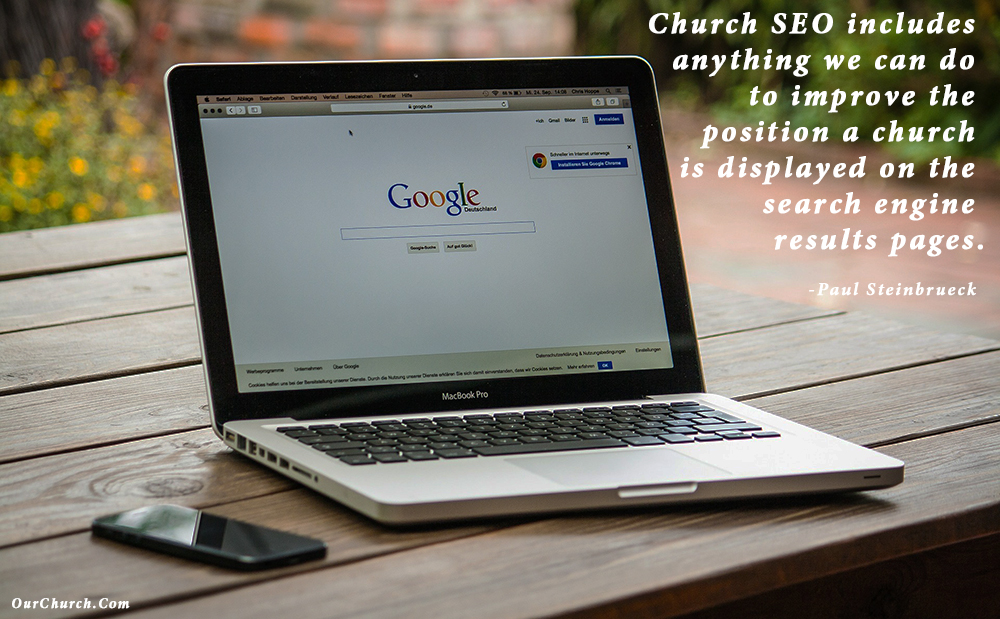
In The 2022 Ultimate Guide to Church SEO, we’ll help you understand everything you need to know about search engines and how to improve your church’s position in the search results so you can reach more people in your community.
The Ultimate Guide to Church SEO includes the following sections:
- 4 Reasons Why Your Church Should Do Church SEO
- The 3 Types of Search Listings
- 6 Technical SEO Things to Check Before They Kill Your Church SEO
- What to Optimize for Better Organic Search Results
- 5 Ways to Improve Local Search Results
- Getting Links and Local Listings
- 3 Ways to Get More 5-Star Google Reviews for Your Church
- The Church SEO Tactic that Improves Relevance AND Authority
- The LAST Thing You Should Do for Church SEO
- Church SEO Success Stories
1. 4 Reasons Why Your Church Should Do Church SEO
A person who uses our church website builder asked us:
Why should [church SEO] matter to me? We’re a small church and I already struggle to manage this site on top of all my other jobs, so what kind of return could I possibly get that would make it worth the time it takes me to invest in this?
Great question!
Before you do decide to do anything, you need to know WHY. What’s the goal? Is the goal worth pursuing?
1) Souls are at Stake
Many of the people who search for a church are not yet followers of Jesus. Let’s be honest, some Christian churches are not all that welcoming to unbelievers. By doing church SEO and improving your search rankings, you make it possible for people who are seeking God to find Him at your church.
Some churches go beyond trying to improve their search ranking for “church in [your city]” to trying to improve search rankings for other things people in their community may be searching for like a divorce support group, recovery support group, mothers of preschoolers group, things to do in [your city], or “what does the bible say about…”
2) Christians need to be a part of a local church
One of Satan’s biggest lies is that a person can be a Christian without being a part of a church. A “Lone Ranger” Christian is about as effective as a one-handed clap.
In John 13:35 Jesus says, “By this everyone will know that you are my disciples, if you love one another.” There are about 100 other “one another” verses in the bible in which we’re instructed to love, serve, help, encourage and disciple one another.
By doing church SEO and improving your search rankings, you can help unaffiliated Christians get connected with your church and fully live out their faith in community.
3) False religions are recruiting online
Do a search for “church in [your town].” There’s a good chance you’ll see an Islamic center, Jehovah’s Witness hall, Unitarian church, and other non-Christian organizations listed in the results. Every Christian church that moves up onto the first page of the search results, pushes a non-Christian organization off the first page.
4) Church SEO produces a positive financial return
The median family income in the US is about $80,000. If your SEO efforts result in just one new tithing family joining your church, that’s $8,000/yr of additional giving. Imagine what your church could do with another $8k a year! And what if you were to add 5, 10 or 20 families?
Church SEO is both a spiritual and financial investment that more than pays for itself.
2. The 3 Types of Search Listings
Did you know there are multiple ways to get onto the first page of the Google search results pages (SERPs)?
That’s because there are 3 different types of listings shown on each page.
Take a look at a screenshot of what I saw when I searched Google for “Church in Tampa” (without the quotes).
1) Paid Ads
The first items displayed at the top of the search results are paid ads. (Note the bold “Ad” displayed to the left of the web address.) Mission Hill Church is using Google’s paid advertising platform, Google Ads. For this search there is just one ad.
With Google Ads, churches pay Google each time someone clicks on their ad. How much they pay and which ad is shown first is determined by a bidding system. Sometimes Google shows as many as 4 ads at the top of the search results. If nobody in your area is bidding on church keywords in your city, there may be no ads.
Google Ads is a good way to get to the top of the search results if you are willing to pay for each person who clicks.
2) Local 3 Pack
Immediately below the ads is a map, along side 3 listings, and a link to “More Places.” Collectively, these items are referred to as the “local 3 pack.”
The information here comes from Google Business Profiles (formerly known as Google My Business). For a church to get into the local 3 pack, it must create and verify a Google Business Profile. Although, sometimes Google creates a church’s Google Business Profile using other data sources (which are not always accurate), and then the church has to claim the listing before it can update it.
Clicking on the map or the “More Places” link will take you to Google Maps where more local listings are shown.
We’ll explain the specific things you can do to improve your local search rankings a little later in this Ultimate Guide.
3) Organic Search Results
Below the Local 3 Pack, Google displays the organic search results (sometimes also called general search results). Google usually shows 10 organic search listings per page. (We’re only showing 2 here for the sake of brevity.)
Notice that not all the organic search listings are for churches. The second one is a Yelp page showing their church listings. Sometimes Facebook pages come up in the search results.
We’ll explain the specific things you can do to improve your organic search rankings in a little bit.
Why Does This Matter?
First, each of these 3 areas (Ads, Local 3 Pack, Organic Listings) provides an opportunity to get onto the first page of the search results. Yes, it’s possible for a church to be in all 3 places.
Second, each of these 3 areas has a different search ranking algorithm. Therefore, the church SEO tactics for ads, local, and organic listings each different.
Google is the highway to your church. -Paul Steinbrueck
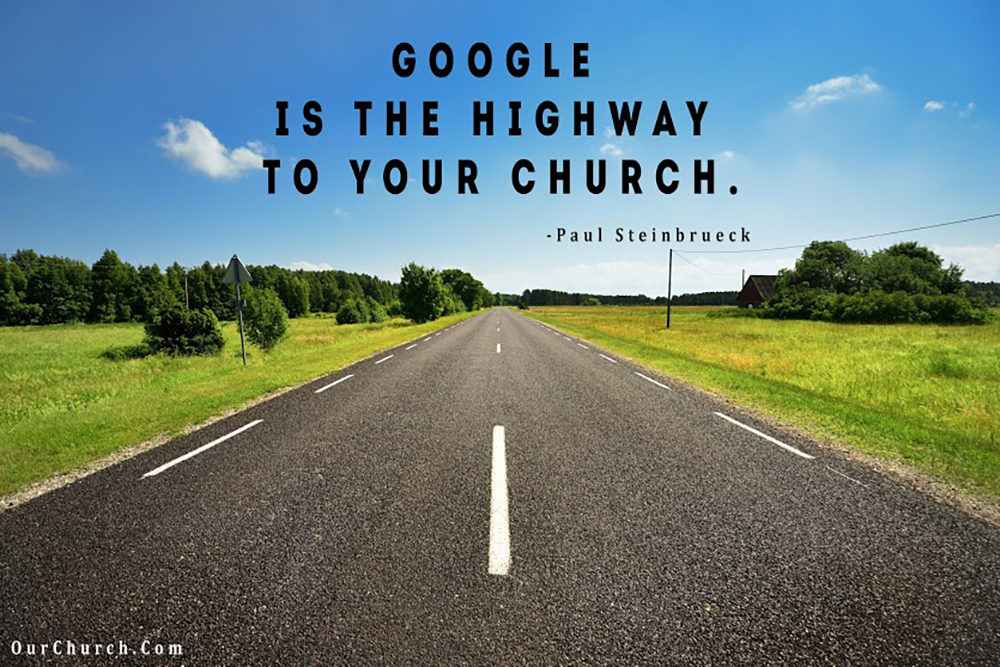
3. 6 Technical SEO Things to Check Before They Kill Your Church SEO
Most of the time when we talk to people about church SEO (search engine optimization), they immediately start asking about what keywords to use and where to put them on their pages. That’s important, but before we go there, it’s important to make sure you don’t overlook some things that could absolutely tank your search rankings.
What are those things?
“Technical SEO” issues.
Technical SEO issues are things related to church website design that could cause search engines to penalize your website or not be able to read it at. To use an analogy…
Failing to address technical SEO issues is like starting your SEO journey with the parking brake left on.
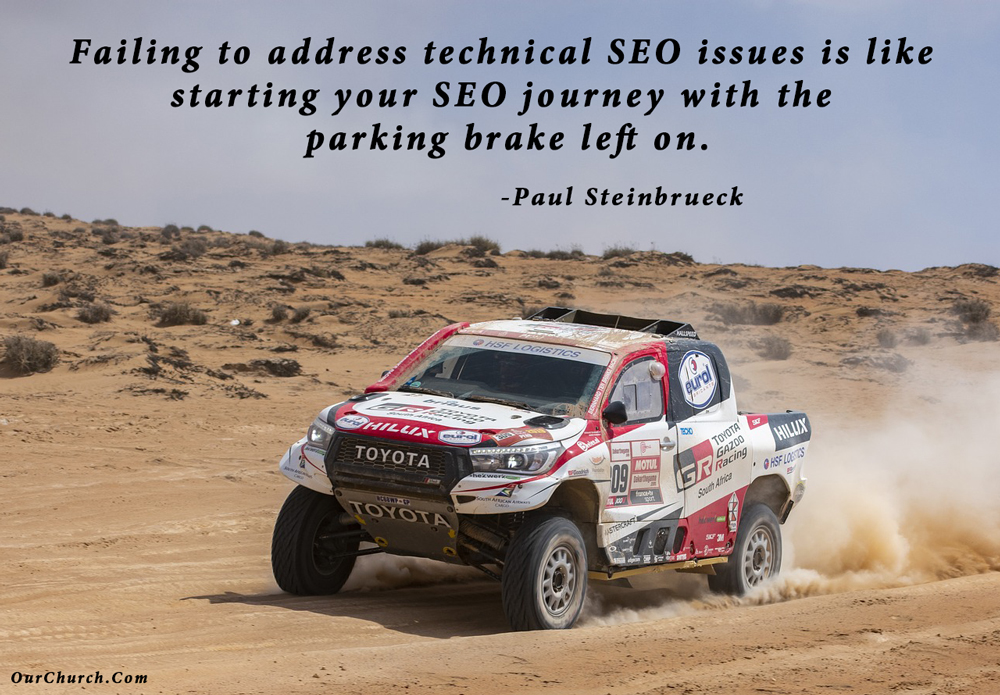
The good thing is, Google wants to be able to be able to crawl, index, and accurately rank your website. They created Google Search Console (GSC) which has the tools we need to check all 6 of the potential problems we’re going to look at in this section.
Connect Your Website with Google Search Console
If you haven’t yet connected your church website with Google Search Console, go there, click “Start Now,” and if necessary, create or login to your Google account.
Next you will need to verify you have ownership of the website. Once you’ve verified your website with GSC, you’re ready to do your first technical SEO check.
1) XML Sitemap
An XML sitemap is a file that provides information about the pages, posts, and other files on the website in a format (XML) specifically designed for search engines to read. (Note this is different than a sitemap created for human visitors to use as a guild to your website). If your website does not have a working sitemap, Google and other search engines may not be able to find all of the pages, posts, videos and other content on your website.
If your website was built using WordPress, you can use a plugin like Yoast SEO to generate a sitemap for you. If you use OurChurch.Com’s WP-EZ Church Website Builder, it has Yoast SEO built in, and automatically creates a sitemap for you.
Submit your sitemap to Google Search Console.
On the GSC Sitemaps page, you should see the /sitemap_index.xml listed. If it’s working, the status will be “Success.” If the status is “Pending” you may need to check back in a few hours.
If the status is “couldn’t fetch,” then you’ll need to check to see if there is a problem with your website’s sitemap or if perhaps it has a different filename. Work with your website developer or web hosting company to get to the bottom of the issue, then resubmit your sitemap or submit the correct filename.
Resume Checks in 24 Hours
If you just submitted your sitemap to GSC for the first time, it may take up to 24 hours for Google to process your sitemap. Look on the Sitemaps page under “Discovered URLs.” If the number of discovered URLs in your sitemap is 0, that means your sitemap has NOT been processed. Come back in a day.
If/when the discovered URLs > 0, continue with the rest of the checks.
2) Crawlability
Crawlability is ability of search engines to “crawl” or read a website’s pages. There are many things that could prevent a search engine from reading pages including server errors, the page being missing, or instructions in a Robots.txt file that tell search engines not to crawl certain pages (pages the web administrator doesn’t want listed in search engines.
Click the “Coverage” menu option in the menu on the left side of GSC.
This page will list all the pages Google could not crawl and provide details on why.
3) Manual Actions (Penalties)
On very rare occasions, Google will penalize a website for breaking its rules. Penalties can be as severe as complete removal from Google. In that case, no amount of SEO will get a website to appear in the search results until the manual action has been addressed.
Click the “Security & Manual Actions” menu option on the left side of GSC and then the “Manual Actions” option to see if your website has been assessed any penalties, and guidance on how to resolve them.
4) Security Issues
Security issues include things like malware. If Google detects a web page has a security issue and could be dangerous to visitors, when people using the Google Chrome web browser try to access that page, they will be shown a warning page instead.
Click the “Security & Manual Actions” menu option and then click “Security Issues”
5) Mobile Usability
Google does not want to show mobile users of its search engines website that will be hard for those users to use. Therefore, if Google detects mobile usability problems with a web page, it will lower the position it’s shown in the search results.
In the GSC menu, click the “Mobile Usability” option to see if your website has any mobile usability issues.
Note that if you’ve used Google’s Mobile-Friendly Test, that test only checks 1 page – the URL you enter into the form. It’s possible a site’s homepage could pass the Mobile-Friendly Test but an internal page have mobile usability issues. The GSC Mobile Usability tool checks all pages on the website.
6) Core Web Vitals
Core Web Vitals (CWV) are a set of metrics introduced by Google in 2021 which are intended to evaluate a website visitor’s experience. Previously Google had Page Speed as a search ranking factor. CWV expand on this.
Google doesn’t want to “recommend” web pages in its search results that are slow to load or give visitors a poor experience, so poor CWV scores can negatively impact your website’s search rankings.
To check to see if any of your web pages have a poor CWV score, click the Core Web Vitals menu option on the left side of GSC.
For more detailed information about the 3 components of CWV, read Core Web Vitals Google Update: What You Need to Know.
Whew!
We got a bit more technical than I ordinarily would like. Any one of these 6 problems could totally kill your church’s search rankings and hinder the effectiveness of any church SEO you do. So, I hope it was worth it.
Do the checks. Fix any problems you discover. Then your website will be primed to win the SEO race!
4. What to Optimize for Better Organic Search Results
We discussed earlier that one of the three types of search listings displayed in the search results are “organic search listings.”
Google’s search algorithm looks at more than 200 different factors to produce its search results. A person could spend years analyzing and optimizing all those factors, so in this article we’re going to focus on the factors that are most important so you can make the best use of your time.
Before we get to the specific ranking factors, it’s important to understand the general concept of how Google ranks websites for each search query, aka keyword.
Relevance x Authority = Search Ranking
All 200+ search ranking factors can be put into one of two categories – relevance or authority.
- Relevance is how closely related a web page is to the search query. Search engines look at the text, headings and other elements on a web page to determine what that page is about, and how closely related it is to a search query.
- Authority is how reliable, reputable and important a web page is. Search engines look at websites that are linking to or mentioning a website, who is posting links to the site in social media and how often, how much quality content is on the website.
If a web page’s content is not related to a particular keyword, no matter how high its authority is, Google is not going to show it in the search results. If a web page is closely related to a certain keyword but has low authority because few other sites link to it, Google will display it in the search results after web pages that are also relevant to the keyword but have more authority.
Therefore, for a web page to rank well in the search results for a keyword it must be very relevant and have more authority than other relevant web pages.
Church Keywords
Before you can optimize any web page, you have to know what keyword(s) you want to make the page more relevant for. We call these your target keywords. For other types of organizations this usually requires keyword research to compare how often various keywords are searched for and how competitive they are, but for churches, there are 3 keywords that are far more popular than any other:
- Churches in [your city]
- [your city] churches
- [your city] church
If there are cities with the same name in other states, then your top keyword might be “churches in [your city, your state]” or “churches in [your city, state abbreviation].”
If your church includes people from multiple cities you can also try to target “churches in [adjacent city].” We don’t target more than 2 adjacent cities because it’s difficult to fit all those keywords into the parts of the web page that can be optimized.
Some churches also choose to target keyword related to their denomination or style of church like “Baptist church in [your city]” or “traditional church in [your city]” but there are a lot fewer people searching for these keywords.
Church SEO to Improve Relevance
Once you know what keywords you want to target, the next step is to try to work those keywords into the parts of the web page that can be optimized. We recommend optimizing the following page elements:
- Title tag – This title is hidden from visitors but read by search engines and usually used as the name of the organization in search results.
- Meta description tag – This description is hidden from visitors but read by search engines and usually used as the description in the search results.
- H1 tag – The largest heading on the page
- H2 tag – The second largest heading on the page
- Text – Regular text on the page can be modified to include targeted keywords several times, but it’s important to remember that your primary audience is still human readers. Don’t make sound awkward for the sake of SEO. And don’t overdo it.
- Image alt and title attributes – Images can be given alt and title attributes that are read by screen readers for the visually impaired and search engines.
- Header/footer – One of the easiest and most important things you can do to improve relevance is to include the name of your church and its address in the header or footer of your website so it appears on every page of your website.
Church SEO to Improve Authority
Improving the authority of a website is much more difficult and time consuming than improving its relevance. For this reason, we always improve a website’s relevance first before we start working to improve its authority.
Here are some things that can be done to improve a website’s authority.
- SSL certificate – An SSL certificate encrypts data sent to and from a website. Google now gives websites with an SSL certificate a slight rankings boost.
- Links – When one website links to another website, Google sees that kind of like an endorsement or vote for the linked-to site. Generally speaking the more sites that link to your website, the better your search rankings. The authority of sites linking to your site also matters. A link on high-authority site like your local newspaper is going to help your website’s authority much more than a link from a low-authority personal blog.
- Local/directory listings – Getting your church listed in directories like YellowPages and church-related directories, is an easy way to get links to your website on high-authority sites. We’ll discuss link building and directory listings in more detail later in this Guide.
- Quality content – A website with lots of well written articles is more of an authority than a website with 7 pages that talk about the church and what it does. This is why better search rankings is one of the many benefits of blogging.
- Social media – While most SEO experts do not think sharing links in social media directly helps improve authority and search rankings, the more people who are aware of your website, content and events, the more people will post links to your website that do have an impact.
With this guidance you should be able to optimize your church website and improve its organic search rankings. After all…
If your church wants to reach people online, those people need to be able to find your church website.
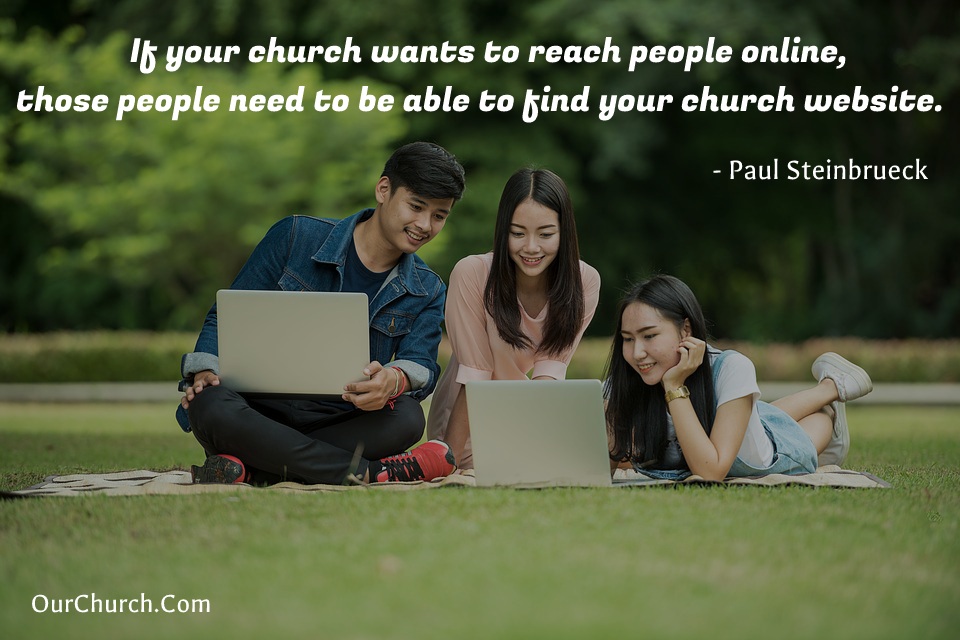
5. 5 Ways to Improve Local Search Results
In the previous section we discussed how to improve organic search rankings. Now let’s turn our attention to how to optimize for better local search results.
Before we get to that, though, it’s important to understand one thing you probably can’t change.
The #1 factor in Google local search results is distance from the city center.
Google has determined what it believes to be the center of every city in the United States. The closer your church is to that point, the better your church’s position in the local search results for “churches in [your city]”.
A while back, I was talking with a pastor of a church in a small town that’s about 20 miles away from a larger city. He wanted his church to be at the top of the search results for “churches in [the larger city].”
I did a quick search on Google Maps and discovered there are more 100 churches closer to the center of that larger city than his church. Additionally, the map Google displays with the results for “churches in [the larger city]” is zoomed in on the larger city to the extent that the location of his church isn’t even on the map.
I had to tell him the only way his church would ever appear in the local search results for that city is it if moved closer to the city or planted a new church/campus in the city.
If your church happens to be located close to the center of your city, you have a built in advantage over other churches. If your church is on the outskirts, you’re at a disadvantage and will have to work harder to optimize the things you can change.
5 Ways to Improve Your Church’s Local Search Results
1) Create, claim and verify your Google Business Profile. While the organic search results includes websites, the local search results only show Google Business Profiles (GBPs). If you haven’t created a GBP for your church, it won’t appear at all in the “local 3 pack” or Google Maps. For step-by-step instructions, see How to Create, Claim and Verify Your Google Business Profile.
2) Update and complete your GBP listing. Make sure the address, phone, web address are accurate. Add a description that includes your city, adjacent cities, your denomination and other descriptive terms people may search for (e.g. Christian, traditional, modern, charismatic) or ministries people may search for (e.g. AWANA, youth ministry, college ministry recovery ministry, weddings).
3) Add photos to your GBP listing. Photos won’t necessary improve your local search rankings but people are more likely to click on a local listing that has photos.
4) Get more reviews. The number of reviews is one of the biggest factors in Google’s local search algorithm. We’ll talk more about the best ways to go about getting more reviews in just a bit. You can learn more in this free resource: The Ultimate Guide to Online Reviews.
5) Optimize your website. The authority and relevance of your website is another major factor in the local search results. If you want to rank better in the local search results, following these recommendations provided earlier in the section of this guide about improving organic search results.
Bottom line…
A verified, optimized Google Business Profile is a key component of church SEO, marketing, and outreach.
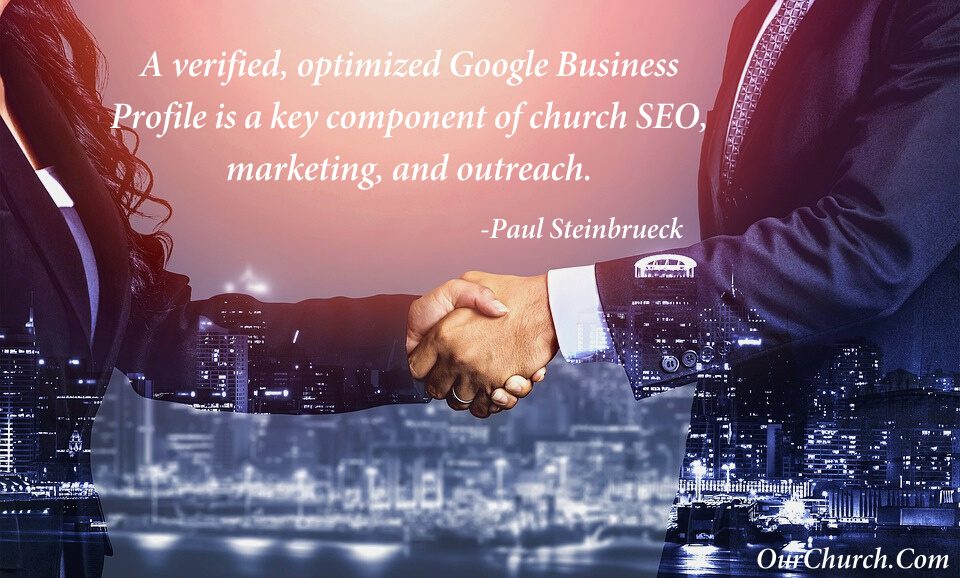
6. Getting Links and Local Listings
Earlier, we discussed how getting other sites link to your website is one of the most important ways to improve the authority of your website and thus its position in the search results.
When a website links to your website, Google sees that as an endorsement or vote for your site. Generally speaking, the more sites that link to your website (and the higher the authority of those sites) the better your search rankings.
4 Major Local Directories
The easiest way to get links to your church website is by creating listings in local search engines and local directories. The biggest and most used local search engines are:
- Google Maps (Google Business Profiles)
- Bing Maps
- Apple Maps
- Yelp
Start with these 4.
More Local Directories
There are dozens of other local directories on the web like CitySearch, SuperPages, and YellowPages. You probably won’t get a lot of visitors from any one of them, but remember it’s not just about visitors from those directories. Each directory your church is listed in will link to your website, and the more links you get, the more authority your website will have, and the better your search rankings will be in more popular search engines like Google.
Church Directories
There are also some church-specific directories in which you can list your church like Church Angel and USA Churches.
New church and local directories get launched every once in a while, and existing directories get discontinued. Therefore, it’s good to search Google periodically for “church directories” and “local directories” to find new directories in which to list your church. You can do this at your own pace. Set a goal to set your church up in one new directory each month, or if your more ambitions, one a week.
Directories are one of my all-time favorite marketing strategies. -Anna Crowe, Search Engine Journal

7. 3 Ways to Get More 5-Star Google Reviews for Your Church
Did you know… the number of Google reviews is one of the biggest factors in Google’s local search algorithm?
Take a moment and see for yourself:
- Google “church in [your city].”
- Look under the map at the “Local 3 Pack,” add together the number of reviews the 3 churches there have, and divide by 3 to get the average number of reviews.
- Click the map in the Local 3 Pack to see the top 20 results in Google maps
- Scroll down and take a look at how many reviews churches towards the bottom of the top 20 have.
Big difference, right?
How do you get more Google reviews for your church?
Glad you asked…
1) Add a Google Business Profile icon/link in the header or footer of your website.
Churches often put social media icons that link to their profiles on social sites like Facebook, Twitter, and Instagram. Add an icon and link to your Google Business Profile. Some of your members will see the icon, click and post a review. It also helps visitors to see all the good reviews your church already has.
2) Post a request for reviews to social media.
If you use Facebook, Twitter, Instagram or other social media sites, post a request for reviews to your social channels and include a link to your Google Business Profile. When you do, let people know that by posting a review, they are helping to improve your church’s search rankings, which will help your church connect with more people online. Positive reviews that cite specific ways God has used your church to change people’s lives help motivate people to visit on Sunday to see what God is up to in your church.
3) Send email and/or texts to members asking them to post a review.
It’s getting more and more difficult to reach people via social media. Email still has a high open rate, and the open rate for texts is nearly 100%. Plus you can make your ask more personal in an email or text.
The same advice given for social media applies to email and texts – include a link and cast vision for how their reviews will help the church accomplish its mission.
One additional bit of advice for email (or any medium you may use to ask for reviews)… Google knows it has a problem with fake reviews. It uses an algorithm to look for patterns in reviews that look unnatural. If your church has a handful of reviews and then all of the sudden gets 50 reviews in one day, it’s going to look suspicious. Nobody knows how many reviews in a short amount of time is too many, but the goal should be to continuously add more reviews.
Therefore, instead of emailing your entire congregation at one time, go through your email list gradually. Try to get around 5 reviews a week. Start by emailing 20 people, wait a week and see how many new reviews you received. If you got 10 new reviews, scale it down and email 10 people the next week. If you got 2 reviews, scale it up and email 50 people the next week.
If that feels like a lot, scale it back and just email one person a week to ask them to write a review.
When it comes to online reviews, you have not because you ask not. -Mark Steinbrueck
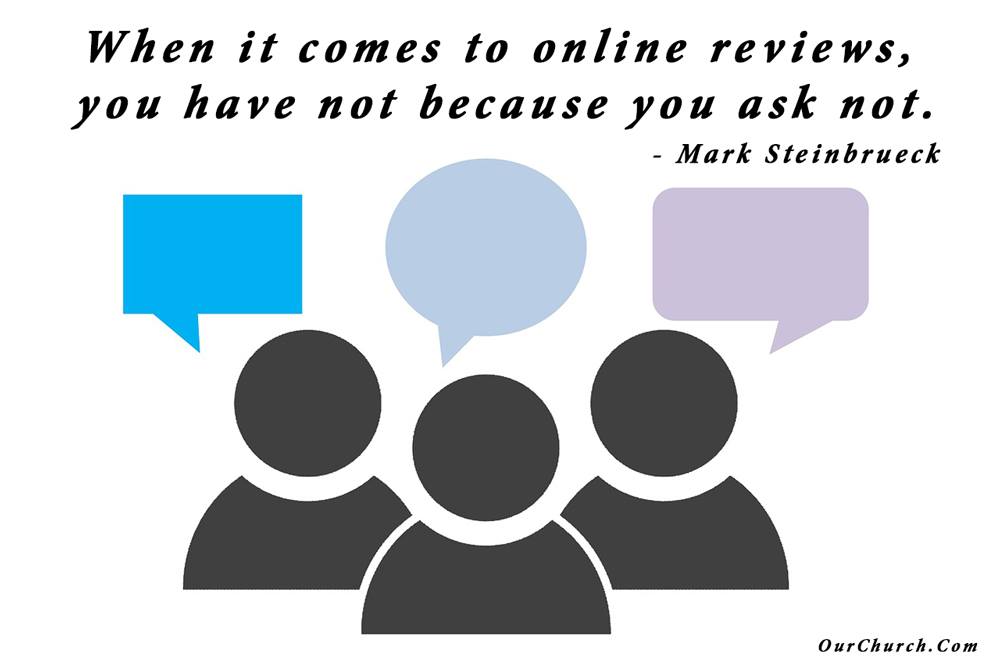
8. The Church SEO Tactic that Improves Relevance AND Authority
To improve a church’s organic search rankings, one has to take steps to improve its relevance (how closely a web page relates to the targeted keyword) and its authority (how reliable, reputable and important a web page is.)
I wrote earlier, “All 200+ search ranking factors can be put into one of two categories – relevance or authority.”
Actually, that’s not exactly true.
There’s one thing that impacts both relevance AND authority:
Quality Content
Content is any information or media. It can be web pages, blog posts, images, audio, or video.
When a church adds content to its website about a specific topic, its website becomes more relevant to that topic. Additionally, the more quality content published on a website, the more authority it gains.
One SEO advantage churches have is they already produce at least one unique piece of content every week: the Sunday sermon.
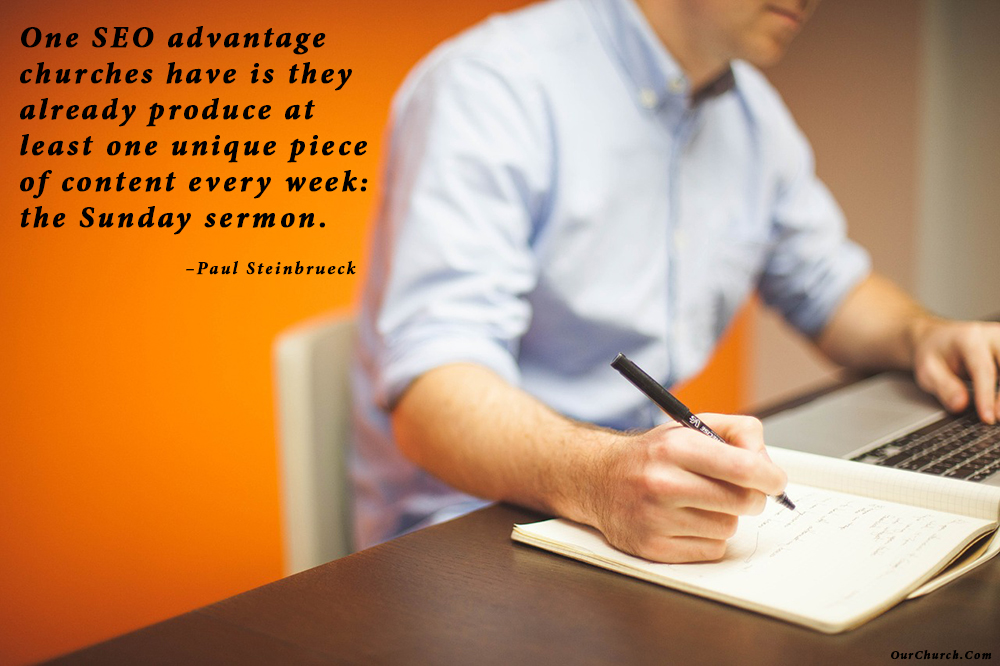
The Sunday Sermon
It’s just a matter of getting that sermon onto the website in a format that is useful for human visitors and readable by search engines.
People like to listen to sermon audio and watch sermon videos, but search engines are still not very good at understanding audio or video content. So, when you put audio or video of a sermon onto a web page or blog post, it’s helpful to also include a relevant title, summary, and scripture references.
Other Church Content Ideas
Chances are your church is already creating other content beyond the sermon that can be also published to your church website regularly, including:
- Weekly bulletin or program
- Announcements given during the Sunday service
- Weekly or monthly newsletter
- Stories of life transformation by those who trust in Christ and are baptized
- Daily devotionals related to the sermon theme
- Thoughts from the pastor (which can be published as blog posts)
Adding quality content to your church website doesn’t have to take a lot of extra time if you start by publishing the content you are already creating and using elsewhere
9. The LAST Thing You Should Do for Church SEO
Throughout this Ultimate Guide to Church SEO, we’ve discussed many things you can do to improve your church’s search rankings.
If you’ve taken these steps, congratulations! You are probably already experiencing a significant improvement in search rankings and seeing more people visiting your website. You deserve to be commended for taking action to help reach people in your community!
But the last thing you should do is stop your church SEO efforts now.
(“The last thing you should do…” is a strange phrase isn’t it? It’s not really the last thing you should do but actually something you should never do.)
Church SEO is never finished.
Search engine engines are constantly changing and so is your website (you are updating your website regularly, right?). Everything you’ve done to improve your search rankings can be undone if you’re not careful. Plus the way people use search engines is also changing.
Here are 5 things to do to monitor and manage your church SEO for long term success:
1) Check your search rankings regularly
We recommend checking your search rankings a minimum of once a month and tracking those rankings over time. It’s normal for a website’s position to fluctuate one or two spots, but if your church suddenly drops 5+ spots in a month, it’s something to look into. Perhaps something on your website has changed or perhaps Google has updated it’s algorithm.
2) Check your search traffic regularly
Use Google Analytics to track how many people are coming to your website from search engines, and compare that data to the previous month and previous year. You can also use Google Search Console to see what keywords your website visitors are using to find your site. You might discover a growing interest in a particular ministry, issue or topic that you can capitalize on.
3) Monitor website changes
When we see a church experience a drop in search rankings and search traffic, the most common cause is changes to the website that removed optimized content. For example, someone might go in and change a heading, rewrite the intro paragraph on the homepage, or replace an image that was optimized with one that’s not.
4) Read about SEO trends and changes
Take a guess… How many changes each year does Google make to its search ranking algorithm?
10?
50?
100?
If you guessed more than 1,000, you’re right. (Crazy, that’s about 3 changes a day!)
Most of them go unnoticed and don’t significantly impact many searches. But consider this: just a few years ago mobile-friendliness, page speed and SSLs had no impact on search rankings. Today all three are factors in Google’s algorithm. We here at OurChurch.Com read a lot of news articles about SEO and when we see something important to church SEO, we write about it. You can stay informed and save time by subscribing to our blog.
5) Continue to grow your authority
In this Ultimate Guide, we discussed church SEO tactics that help to improve your church’s authority in the eyes of the search engines which leads to better search rankings. Things like setting up local listings, getting online reviews, and creating quality content. A good long term church SEO strategy involves continuing to do these things on a regular basis.
The bottom line is…
SEO is an ongoing project, not set-it-and-forget-it. -Rebecca Lieb

10. Church SEO Success Stories
Sometimes when we talk with church leaders about Church SEO, they respond with something like:
“I know we need better search rankings to reach more people searching online, but does church SEO really work?”
We could answer that question ourselves, but we thought you might prefer to hear from some of the churches we’ve worked with.
Search engine optimization: you need to have it, it’s well worth it, and they [OurChurch.Com] do it right. -Jack Scalfani, Knott Avenue Christian Church, Anaheim, CA
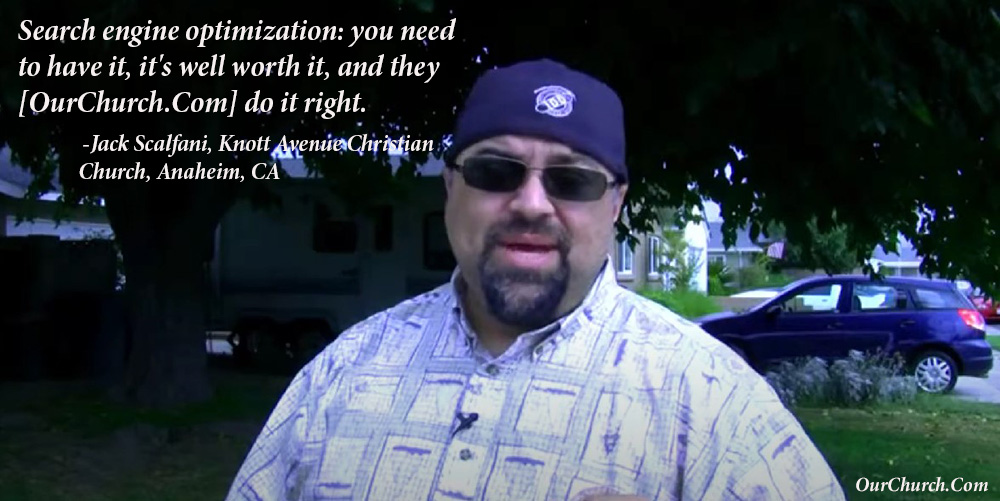
Read: Case Study: Knott Avenue Christian Church – Church Growth Through Search Growth
We appreciate being in the top 10 for lots of other phrases, but none of that matters if we’re not in the top 10 for “Church in San Diego.” -Brett Schoeneck, Barabbas Road Church, San Diego, CA

Read: How This Church in San Diego Went to #3 in Google
I offer my highest recommendation to OurChurch.Com. They have a keen grasp of developing n effective strategy of search engine optimization. –Beverly Leasher, North Way Christian Community (6 locations in the Pittsburgh area)
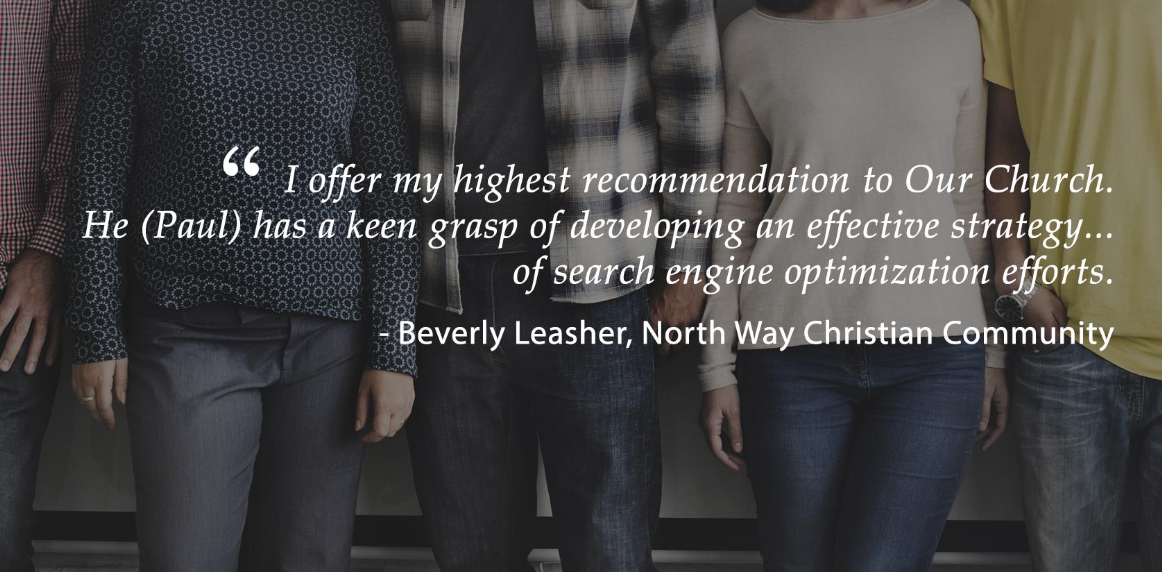
Church SEO – Tips from the Pros
We close the 2022 Ultimate Guide to Church SEO with some advice from some local SEO and church communications experts.
 Search rankings are constantly changing, but there three things you can count on: Have great content, optimize for mobile, & make sure your site is user-friendly. Google’s latest algorithm changes favors these things so your site ranks higher in search results. -Dawn Nicole Baldwin, Lead Strategist, AspireOne.com
Search rankings are constantly changing, but there three things you can count on: Have great content, optimize for mobile, & make sure your site is user-friendly. Google’s latest algorithm changes favors these things so your site ranks higher in search results. -Dawn Nicole Baldwin, Lead Strategist, AspireOne.com
 Make it easy for your church to post online reviews. A growing number of 5-star ratings on Google and Facebook will help you stand out and boost your visibility. I recently gave a short announcement at my church sharing one URL with links to Google & Facebook Reviews, and we got a great response! -Matt Ehresman, CourageousStorytellers.com
Make it easy for your church to post online reviews. A growing number of 5-star ratings on Google and Facebook will help you stand out and boost your visibility. I recently gave a short announcement at my church sharing one URL with links to Google & Facebook Reviews, and we got a great response! -Matt Ehresman, CourageousStorytellers.com
 Content. That’s it. There are lots of technical things you can do that will help, but the easiest way for most churches to improve their SEO is to create good content and post it online. Let your website archive grow and give search engines more things to link to. -Kevin Hendricks, ChurchMarketingSucks.com
Content. That’s it. There are lots of technical things you can do that will help, but the easiest way for most churches to improve their SEO is to create good content and post it online. Let your website archive grow and give search engines more things to link to. -Kevin Hendricks, ChurchMarketingSucks.com
 Add backlinks to internal web pages. Create pillar content with other content that links to it. What does that look like for a church? Create a kids ministry page with links to other pages about kids ministry. This is what SEO experts call the cluster topic model. -Katie Allred, ChurchCommunications.com
Add backlinks to internal web pages. Create pillar content with other content that links to it. What does that look like for a church? Create a kids ministry page with links to other pages about kids ministry. This is what SEO experts call the cluster topic model. -Katie Allred, ChurchCommunications.com
The 2022 Ultimate Guide to Church SEO was written by the OurChurch.Com team which has been helping churches, schools, nonprofits and businesses live out their mission online with web design, web hosting, and SEO since 1997.



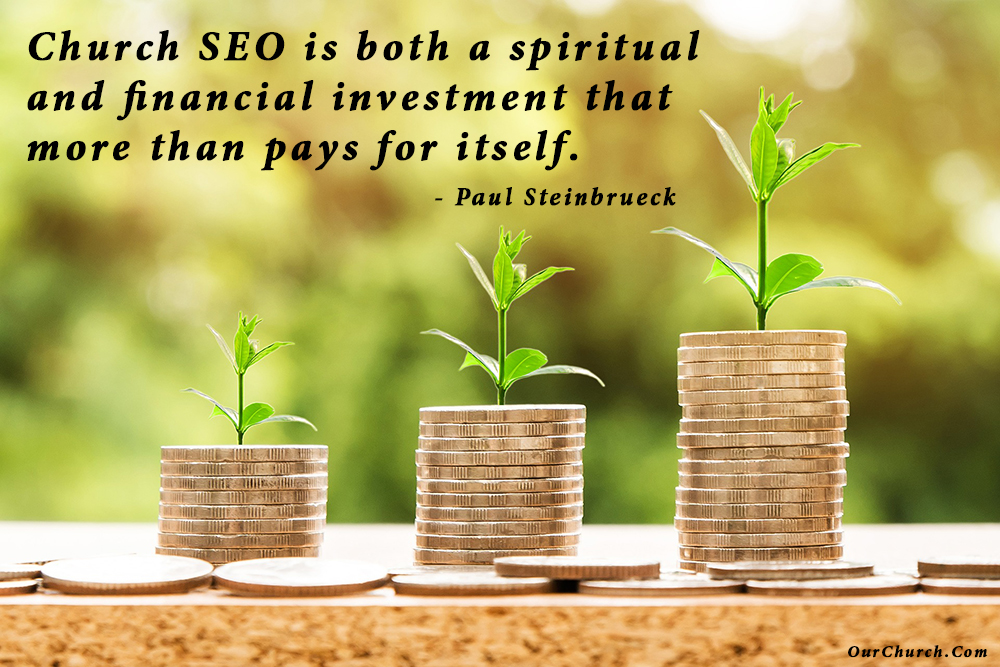
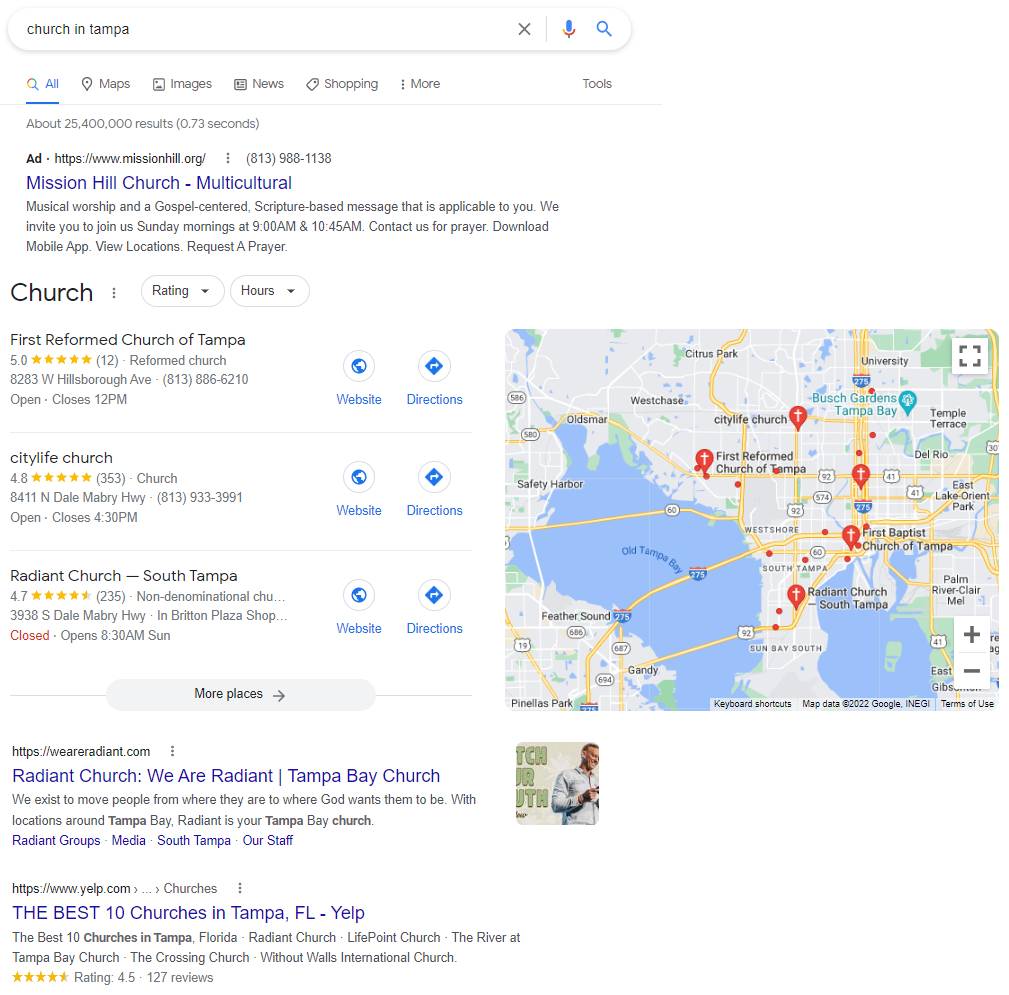
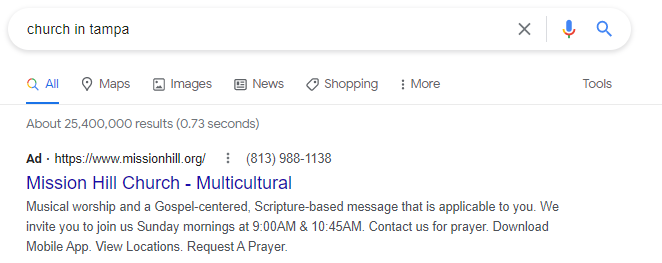
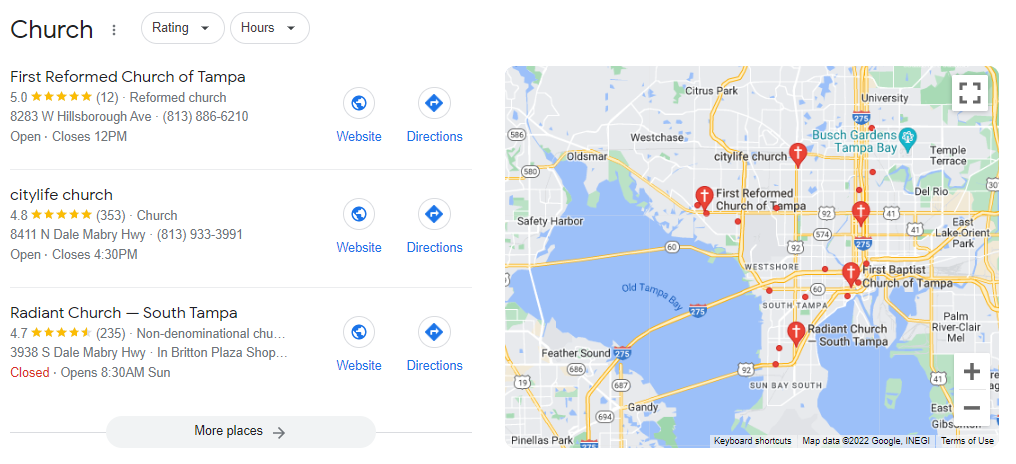
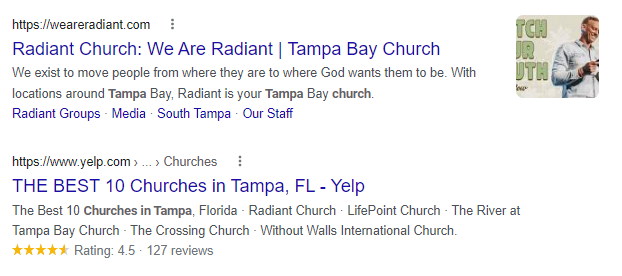
2 Comments
An excellent resource on SEO.
Interesting and useful content, thank you for sharing.